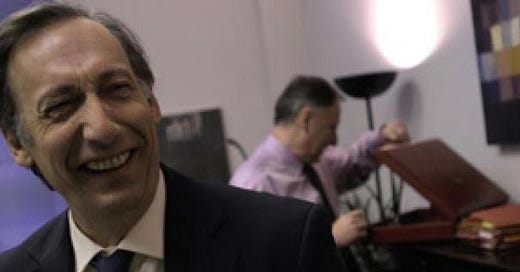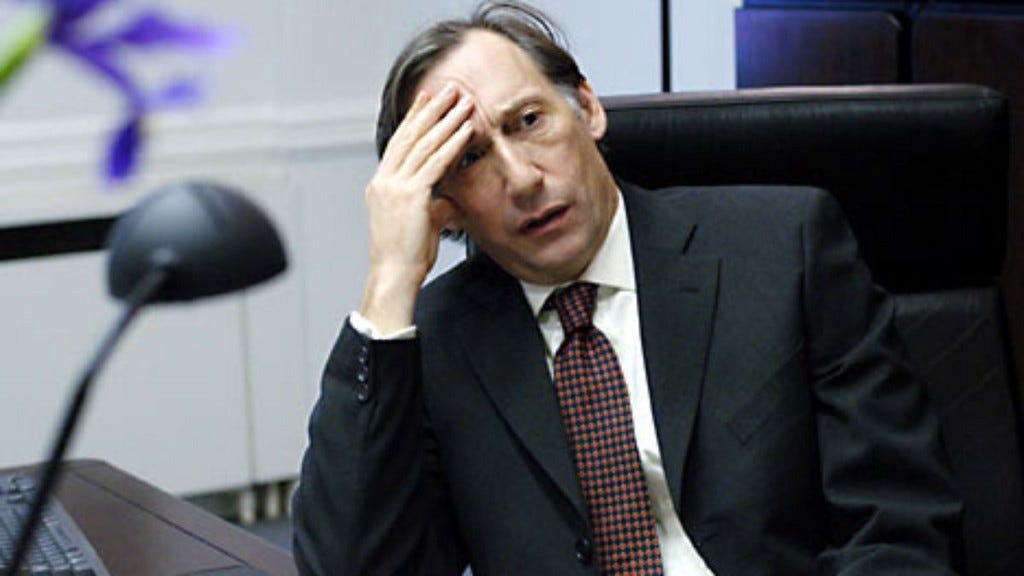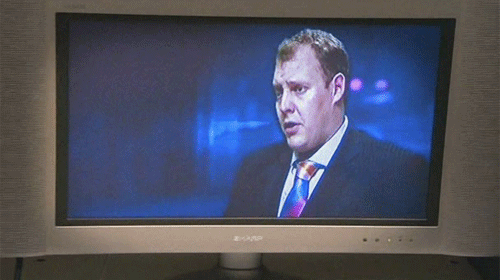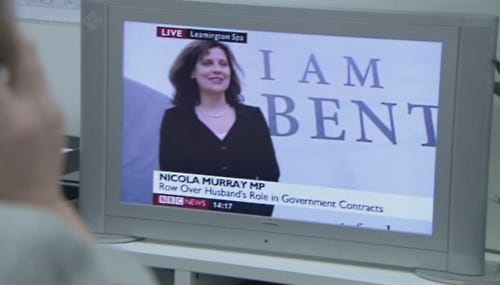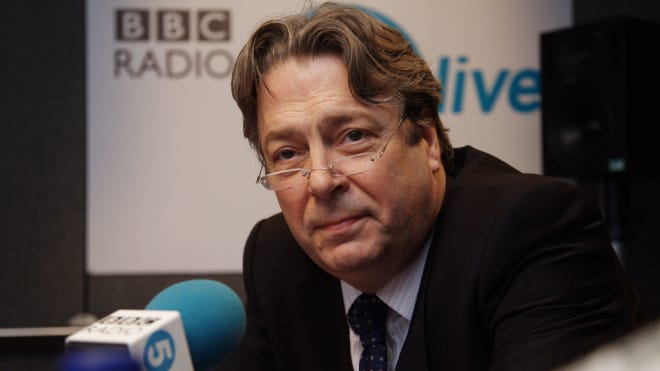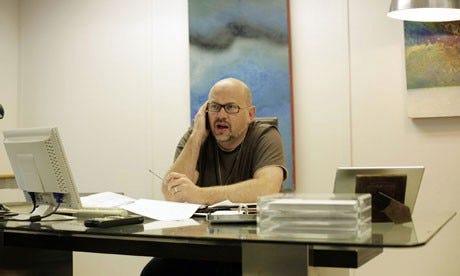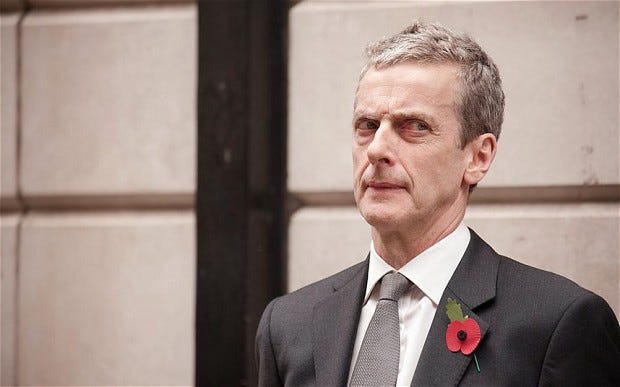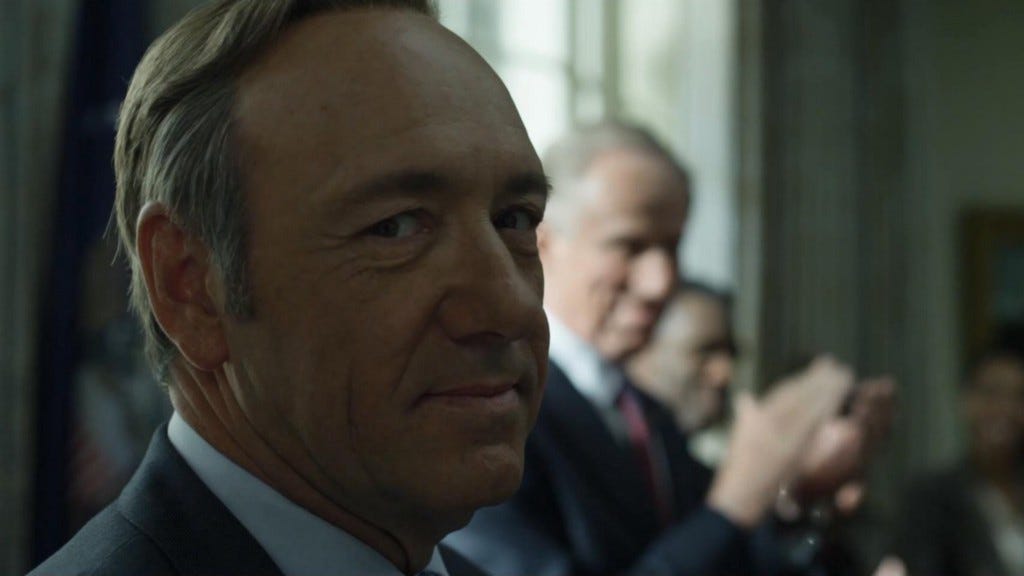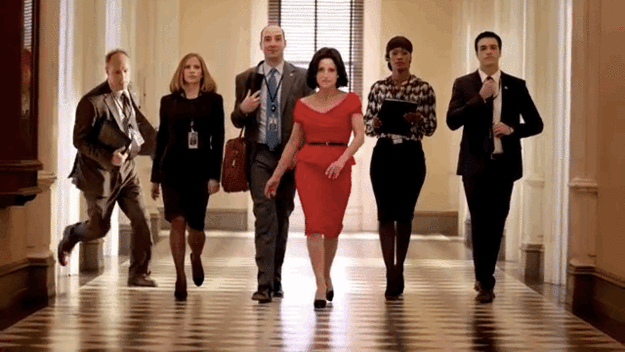The probability that an aide to Hillary Clinton has prefaced advice to her with ‘Khaleesi’ must surely now be approaching one. In such dark times, it’d be good to pay attention to the other HBO show about women in power returning to our screens. The question is, why hasn’t Veep had the same impact yet on British culture as its predecessor? Especially when the four seasons of Veep so far are the greater achievement than the sum of The Thick of It.
The immediate half-answer is that Veep is about the American political system, not the British. You’d assume though the kind of people who are into British politics enough to watch a comedy about it might also have some dim interest in the local superpower. But the misconception lingers that the show is the US remake of The Thick of It (a pilot was made for one, but it wasn’t Veep), and so it gets treated with same combination of disappointment and scepticism as remakes of The Office or Spaced. At the same time, it hasn’t helped that if you want to avoid streaming Veep you can only find it on ‘Sky Atlantic’, not a business class lounge but the aspirational channel where most half-decent American shows get squirrelled away here. So despite Veep having the greatest joke-density of any TV show since The Simpsons, it’s had to overcome an unfair mistrust.
Whenever you’re told about a person who’s hilarious, a real crack-up, already you’re poisoned against them. It’s even worse for a comedy show, going around calling itself comedic from the outset. On top of that, TV comedy has to deal with and aim for different types of laughter. First and most obvious, surprise. Hopefully, the audience laughs at new gags and punchlines the first time round. Second, familiarity. The audience watches the show again since it’s always on repeat, or they own the box-set, or want to show friends — and they still find it funny because now they appreciate the way the jokes were done, or simply because they ‘recognise’ the funny bits and remember to laugh. Finally, related but different: affection. After a certain point of love for a show’s characters, almost everything they do and say is funny: it’s the kind of affectionate delighted laughter you give the antics of your kids or pets.
This affection has to build, usually. After enough big laughs within a decent amount of time, the audience commits. The problem that Veep shares with most comedies is that few are very funny straight off. A whole series can go by and merely be ‘alright’. It’s only when you’re a few series deep (and already rewatching earlier episodes) that you start laughing your hardest. Rare is the show that doesn’t have to struggle in this way.
One show, however, didn’t have to. That show was The Thick of It.
“I’m an elected representative of the people. It was funny.”
In the space of six episodes, comprising its first two short series, The Thick of It established itself as one of the best written, performed and directed comedies on TV. Appearing in the hangover Blair years, it looked at first like a modest, low-budget, improvisational show. It proved however to be the pinnacle of Armando Iannucci’s career so far, one of those works that impressively brings together an artist’s previous concerns: the out-of-touch middle-aged men of Alan Partridge, the aghast laughing at 21st century politics of Time Trumpet, and the strange and restive British people of The Armando Iannucci Show.
Like Spaced and The Office before it, the show won over its audience in a run-time shorter than a Godfather film — and a sort of audience that was either evangelical or jealous, seeing love for the show as the badge of a true connoisseur. Its central comic premise could be summed up by a moment in Series 2 when Hugh Abbot MP was on his way to a factory for the kind of inane photo opp that’s the staple of the life of a politician. Asking after journalists who might be there, Hugh discovered his civil servant Robyn had only contacted the regional press:
Robyn, all events are regional. Everything that happens in the world has to happen somewhere. Do you see? Even JFK’s assassination was a regional event. But it was also very important. Like this factory visit.
It was in this gap between importance and self-importance — characteristic of modern British politics — that the show-makers found their comedy motherlode. Related to the gap the disconnect between politicians and the public, the way in which the more you were in the loop of government the more you were out of touch with those you governed.
At the off-centre of it all was Hugh (Chris Langham), Minister for Social Affairs and Citizenship, but also spin doctor Malcolm Tucker (Peter Capaldi). Together, they drove the story — neither one fully protagonist or antagonist — through their clashing personalities: depression and worry meets rage and violence, as if the show was a workplace comedy starring Eeyore and the Tasmanian Devil. It wasn’t only their relationship, however, that was key to the show’s success but the network of the core cast. Alongside Malcolm and Hugh were two special advisers: Hugh’s rusty retainer Glenn Cullen (James Smith), and Olly Reader (Chris Addison), your PLP Lad with a PPE; and frustrating them both, civil servant Terri Coverley (Joanna Scanlon), a one-woman ‘I told you so’.
Each was as bitchy as they were deserving of others’ bitchiness. Not a single one was a dud. Miraculously though, the same could be said of every minor character —at least to begin with — making the show a true ensemble masterpiece. Civil servant Robyn Murdoch was played by Polly Kemp as a permanently affronted jobsworth who liked to compare menial tasks to slavery; while think-tanker Julius Nicholson (Alex McQueen) proved that creating a smarmy character isn’t just about blue-sky-thinking dialogue but having them move over a chair for a meeting in the most irritating way. And special mention must go to Jamie (Paul Higgins), Malcolm Tucker’s Scrappy-Do, a hit from his first moment on when Malcolm asked him how a certain minister was coping and he replied: “Oh he’s shitting himself, [laughs] he said it’s like being in the Twin Towers on 9/11 [affects Posh Old Man voice] ‘just… fucking… waiting.’”
“That’s top swearing”
Dialogue like Jamie’s was a reason why The Thick of It soon earned a reputation as one of the great verbal comedies. (If it’s not clear by now this article is decked out with lines from the show.) But then the writing is so well-tuned, so deservedly harsh —so spot-on — that writing about it often just becomes a case of quoting.
What’s less simple to get across is the quality of the show on other levels. It excelled at visual comedy, both in the performance and direction: Malcolm Tucker’s angry running; the way passive aggressive door-closings visualised who was in and out of the loop. But you can’t really post quotes about structure, and paraphrased sight gags are never as funny. Consequently a shallow take on The Thick of It soon emerged.
If you ask fans to sum up the show for you, they might say ‘swearing’. They might even point to the Special episode’s infamous ‘iPod’ speech. One dismissal of Veep runs along these lines, as though Americans can’t do ornate swearing as well as Brits, or there’s an in-built naffness to their attempts, like when they say ‘fam’ or ‘wanker’ or say ‘X’ instead of ‘designer drug ecstasy’. This proprietorial smugness would give The Thick of It the dubious honour of making swearing in the UK a macho parlour game, the kind practised by your average Dawkins-interactor and ending in the low form of the compound animal swearword (“fuck-puffin” etc.)
At the same time, and in a similar way, there was an elevation of the Tucker-esque savvy cynic into a political role model, as though the show had never ridiculed the same (let alone by the time of the finale literally put the cynic in the dock). Soon every other commentator ached to write the best eye-roll of a column on the latest omnishambles by those clowns in parliament. By now there are multiple roleplaying accounts of Malcolm Tucker (and later character Peter Mannion MP), tweeting sweary one-liners about Wikileaks or Jeremy Corbyn. It’s easy to imagine The Thick of It becoming this generation’s Blackadder — another comedy about the thickness of those in the midst of power — so prepare for years of line-for-line campus renditions.
But the show itself was anything but macho or smug. What united its characters was a mood of stress, anxiety and depression — in a good way. This came out via their pettiness, their humiliations, in their scatterbrained attention to the wrong details, ranging from middle class Olly’s failed attempts at talking ‘street’, to Hugh quibbling over office furniture. (All he can say after forcing Terri to take the blame for a disastrous email he sent then watching her apology being filmed in the lobby is: “Christ, it’s those sofas again.”) This mood captured the grey measliness of the characters’ world, a place where taking a dump without reading The New Statesman was the height of luxury. A life in politics, said the show, is an education in bathos.
Quoting swears and one-liners also neglects how important line delivery was to whether a joke was funny. Later in the show’s run, there’d be one too many examples of how a mediocre performance undercut otherwise clever dialogue.
By contrast someone like Chris Langham as Hugh Abbot landed every single one of his lines. From his citation of Derrida to justify lying about whether he’d emailed a child the word ‘cunt’, to the way he gloomily watched The Bill to get more in touch with the British public, Langham’s performance as Hugh Abbot was the kind of multi-faceted brilliance that only Julia Louise-Dreyfus in Veep could compare with. Having previously done the voice-over for fake documentary People Like Us, Langham was adept at being hilarious even off-camera. As much as Peter Capaldi, Chris Langham had the straight-off-the-mark quality that ensured the show’s early success. Then Langham was arrested for sexual assault and downloading child porn. He was acquitted of the former charges and convicted of the latter.
Rewatching his episodes, it’s hard not to wince at lines like “registered nonce” or “I look like a disgraced geography teacher” or “I didn’t rape anyone.” And the sober tone to which you’re meant to switch when talking about what he did betrays the weirdness of the whole matter, the discomfort you feel when reading and writing about the legal case even in the context of a TV review.
And so it might seem tasteless to pull out of the life wreckage of Chris Langham’s crimes the impact that they had on a popular BBC2 comedy. But then that’s exactly what Iannucci and his team had to do. (Imagine a cast member of Friends had been caught with child porn. Imagine Seinfeld arrested for sexual assault. How would the writers have gotten around that?) More to the point, Iannucci and team were faced with the task of working around the indefinite absence of a cast member while his trial remained ongoing and the British press were at fever-pitch. And to write in the knowledge that the man had reached a career-high with the show, a high which might be his point of departure (as it in fact proved).
The best artists take on the challenges and limits of their form — in TV these have to include how a show is affected by the real world — and they try to come up with solutions. But how exactly do you solve the challenge of replacing one of your main characters, and best actors, after just six episodes?
“You don’t deserve to live.”
The solution was a pair of hour-long specials, ‘Rise of the Nutters’ and ‘Spinners and Losers’ (plus the shorter web episode ‘Opposition Extra’). The first was about when the Prime Minister would resign; the second about whether his chancellor would take over leadership of the country or end up being pre-usurped. Both episodes were unified by the theme of who was in or out of the loop.
Together these Specials were a masterclass in comedy plotting — both structurally and in regards to their fiasco of realpolitik. After the story’s climax of second- and third-guessing, presumed leadership contender Dan Miller arrived to casually unravel everything, neatly summarising the night’s plotters for the audience via his polite good mornings: “Malcolm.” / “Dan.” / “Ben.” / “Dan.” / “Jamie.” / “Oh let’s just oil up and start fucking shall we?”
The peak of the Specials, arguably the peak of the whole show, was the moment when amid all the plotting, Ben Swain MP (Justin Edwards) had to go on Newsnight with Jeremy Paxman. This blink-inducing, shuttle-crash of an interview would be described by colleagues tuning in at home as “worse than ’Nam” and “like watching a lion rape a sheep, but in a bad way”. Edwards played his part so well here it’s difficult to imagine even arch-bumbler Langham in full sweaty upper-lip mode topping the performance.
To credit the writers with foresight, or at least a talent for planting promising seeds, the show’s ending began in the Specials. In an attempt to force the PM to announce his resignation date, Malcolm would leak his legacy, only to make the resignation happen earlier than anybody was prepared for; this was Malcolm’s first major misstep, and one so bad he had to go for a walk. (“How do you think I got in here? I fucking walked didn’t I?” / “Yeah but you don’t go for a walk.”). The fall of Malcolm Tucker had begun. Alongside this, Glenn’s loyalty to an absent Hugh would be unreciprocated and so spark his first meltdown, one mirrored by a more upbeat version in the show’s finale. That they used Chris Langham’s absence to create the emotional hinge of the Specials, which in turn would build to the creaky moral hinge of the entire show — Glenn’s principled stand (of sorts) — is another example of the show-makers’ talent, if not straight-out ballsiness.
Not that ‘Rise of the Nutters’ and ‘Spinners and Losers’ are the best episodes, exactly. Though the Specials contained the show’s best moments, they also contained the seeds of its decline: the repositioning of Malcolm, for one; and the first of some unconvincing performances in Daily Mail editor Adam Kenyon (Ben Willbond). And though Langham’s absence was built in to the immediate plot and used as a cause for later events, it also by that same token drew attention to itself. The device that Hugh was away on holiday in Australia couldn’t help but be shaky. For of course the show couldn’t let us see him remotely fretting about position while turning pink on Bondi beach and so only reminded us of the reasons in the real world, and outside the story, for his absence. The show could not go on.
“Don’t call me Nicky.”
Langham was not key to the magic of The Thick of It; however his permanent absence created a long-term structural problem. The best characters are never just individuals but points in a constellation: Olly and Hugh were defined not only by their Senior and Junior SPAD roles and comparative ages, but how these affected their relationship with and loyalty to Hugh.
Fortunately a solution was already built into the show and the political world it portrayed. As Malcolm explained to Hugh’s predecessor in the very first episode, “You’ve had a good innings — you’ve been here for 18 months.” (During the jittery Blair/Brown era, few cabinet minister lasted longer than two years before a summary reshuffle.) Within this world, it made sense Hugh would be dumped and replaced by yet another minister.
Enter Iannucci favourite Rebecca Front, to play the well-meaning, ‘Rescue Remedy’-dropping Nicola Murray MP. Once again, the show smartly worked with its limits and challenges, building in the scepticism fans might feel towards a new minister by having Malcolm tell her himself, “This here is Series 10 of The Big Breakfast, and you’re the fucking dinner lady they’ve asked to present it.” Meanwhile, Rebecca Front’s credentials were reassuring; she’d always stood out in programs like Fist of Fun or her various Chris Morris / Armando Iannucci / Steve Coogan incarnations. And, suitably, her previous role had been the forever shat-upon Cath in the Julia Davis series Nighty Night. This nice-but-glum character of a middle class middle-aged woman was what Rebecca Front would bring so well to her role as Minister for Social Affairs and Citizenship.
For the show was starting to toy with the noble intent of exploring what it was like to be a female politician. Within her first episodes’ worth of media scrutiny, Nicola Murray had gained a reputation for being a sourpuss — though you imagine any female politician a shade less brassy than, say, Joan Rivers would be branded uptight by the UK press. This exploration kept going further and further — one of the many things transferred from The Thick of It to Veep via the DNA-swap of the film In the Loop. The gum disease, in that film, of Secretary of State Karen Clark horrified her prissy male colleagues, one of whom remarked, “I can’t stand to see a woman bleed from the mouth. It reminds me of that Country & Western music.” Karen’s working relationship, meanwhile, with her aide Liza Weld formed a model not only for Nicola and her Series 4 adviser Helen Hatley (Rebecca Gethings), but also Veep’s Vice President Selina Meyer (Julia Louise-Dreyfus) and her Chief of Staff Amy Brookheimer (Anna Chlumsky) — relationships that can best be described as hair-pulling frustration behind the sisterhood.
Old characters returned as well to The Thick of It with a new lick of paint, or in Glenn’s case, a new suit that made him look like a “gay department store worker”. (It wasn’t simply touching that Glenn tried to deny his obsolescence by dolling himself up: it was another stage of his emotional centring in the story…) The Opposition, first introduced in the Specials, now had their own full storylines, most memorably that of Peter Mannion MP (played by Roger Allam, who surely must be gearing up for his starring role in the inevitable crowd-funded Christopher Hitchens biopic).
Mannion was the honourable non-racist Tory refusing to toe the new party line without moaning about it first: “Should I not do my flies up? Let the old chap flop out, is that modern enough for you?” Clearly, the show’s dialogue was as charming as ever. (“I despise him as much as I presume James May despises himself.”) And the show was doing new things formally, in particular a sort of leaky Bottle Episode where the department went on lockdown after an accidental leadership bid (Nicola managed to get to her car for a moment before scarpering back inside). That episode was also when Malcolm’s flaws and mistakes reached crisis point.
Yet the foregrounding of Malcolm Tucker proved to be fatal. That’s not to say he didn’t do anything to earn his new place in the spotlight. Peter Capaldi’s acting kept getting better, a hopeless fight with a seatbelt reaching ‘thrashing-a-car-with-a-branch’ levels of iconically pointless rage. A great new ear-worm was Tucker’s way of aggressive consoling: ‘hey hey hey’ coming out in his accent as ‘hi hi hi’. The stakes rose too; his foregrounding as a character in the story was accompanied by a diminution of his position in government. New character and party VIP Steve Fleming, played by David Haig as an excellent psycho, forever fake-laughing through gritted teeth, had returned from Malcolm-imposed exile. Spooked by this, and eventually sacked, Malcolm bizarrely and amusingly (albeit temporarily) got nice, to the point that his ex-colleagues couldn’t work out whether he was flirting or dying. “I used to be the fucking pharaoh,” as he complained to Terri. The pharaoh had his BlackBerry confiscated.
Our show had a protagonist after all, and one for whom you could start to project an overall story arc. Or was the show still meant to be an ensemble piece refreshed by new characters? Or both? In the first two series Malcolm’s function was to terrify and trip up the rest of the characters; the show hadn’t been about him. But now we had Malcolm the chef, Malcolm the potential TV personality; we saw him be touchingly protective of his ever-reliable PA, Sam. Most unexpectedly we even saw, for a second, what appeared to be his child. Early on Olly had described Malcolm as being “like a bad Gandalf” — another angry character who flits in and out of the story, a mover-and-shaker , but never who the story’s about. Does anyone really care whether Gandalf had kids? (Speak, O fanfic.)
Amid all the gear-shifting and genre-tweaking the show tried to maintain its joke hit-rate. Nicola Murray’s funniest moments mostly came from her sheer awkwardness at everything. “You might comment,” she almost quotes, “I couldn’t possibly say yes.” (Olly in the corner doing a double-take.) Her reaction to Steve Fleming’s cuff of her cheek — phasing by the millisecond between startle, shudder and fake smile — was a dense flourish of expert physical comedy. (A moment too that said volumes about her position as a woman in pseudo-power.) And in terms of drama her family life was genuinely more affecting than Hugh Abbot’s distant (although perfectly poshly-named) kids, Alicia and Charlie. By her first episode Nicola had already put work before family, crying about this later in the shabby office of her daughter’s headteacher.
But the show never quite found an aspect on which to make Rebecca Front’s character stand out — in the sense of impact but also clarity. Comedies work best with types, which are then given shading. Nicola started off too ambiguous. She was too normal, too nice, even a little too savvy — straight on to Malcolm’s manipulation of her from her first episode (though, significantly, he just told her she was crazy).
But then what else could’ve worked? A Hazel Blears figure played by Julie Walters? Rebecca Front as Polly Toynbee? Because the problem was never Front’s performance nor its mismatch with her character; it’s the question of what her character was meant to do for the story. Was she supposed to be an example of the sincere backbencher corrupted and/or brought to heel by ‘Party First’ Malcolm Tucker? The show definitely seemed to be setting up some kind of, if not ideological, at least temperamental opposition between the two of them:
MALCOLM: This Nicky, it’s a war. It’s a fucking war. Now you can’t change a thing unless you win the war, and you can’t win the war unless you’re prepared to fight.
NICOLA: That’s what it’s all about for you isn’t it, it’s just about fighting and fucking power. Does it never occur to you that your poisonous male obsession with conflict, which is making people despise politics — and by the way don’t ever fucking call me Nicky…
Yet their conflict was never enough, and the question kept nagging: Who might be the best foil for the Hugh Abbot-less Malcolm Tucker, infuriate him as a character but also balance out his energy in the story?
The show came up with several candidates. Stewart Pearson, based in part on David Cameron’s barefoot policy guru Steve Hilton, was an occasional sparring partner, if not an equally-matched one. There was always something off-kilter about him, the odd combo of the Ginseng tea and techno babble on the one hand, and on the other his attempts at Tucker-style aggression. You can see how these things might be linked in the real world but in the show they only ever seemed juxtaposed; one didn’t reveal itself to be part of the other. (Years later HBO’s Silicon Valley had much better luck at depicting the hippy-capitalist.)
Malcolm’s nemesis Steven -“Steve!”- Fleming also rose and fell too fast. If only he’d arrived sooner to torment Malcolm; or if the show had even dropped the ministerial focus (after all, they did so by the next series) and moved to No.10 for the election meltdown. That also would’ve given Malcolm a chance to clash directly with his counterpart in the Opposition, Cal ‘The Fucker’ Richards. Cal, played to new depths of psychopathy by little Tom Hollander, was like a Malcolm Tucker stripped of any residual class comradeship; but he only made an appearance at the end of Series 3. And as great as Hollander’s cameo was, it never quite topped Peter Mannion’s thrilled response at his imminent arrival: “Ah! The Fucker!”
Even In the Loop couldn’t find someone who had the right purchase with Malcolm, and it had James Gandolfini. At first, Malcolm Tucker vs. Tony Soprano felt like a fantasy gladiatorial match-up. (Not to mention the comforting return of the latter’s angry nose-breathing.) But their scene together was neither the Heat showdown the audience wanted, nor a send-up of the same. Pitched instead halfway between, the weird sexualised insults of “General Flintstone” were only just about saved by Malcolm’s closing statement: “Don’t ever call me fucking English again.”
“Quiet bat people”
You have to appreciate just how much Team Iannucci were doing between the end of the Specials in 2007 and the show finale in 2012: not only the filming of In the Loop, but the failed pilot of the US Thick of It, then the beginnings of a brand new show in Veep.
Nevertheless, when The Thick of It began its final series, the imbalance remained. The Fucker never came back; even more tragically, neither did Jamie, whose kid brother partnership with Malcolm had always been such a joy, especially since they were the only two characters who seemed to actually like each other (something which would’ve made Jamie a far more affecting traitor of Malcolm in the end). Instead, generously, but unfortunately, the final series gave room to some of the show’s weakest characters.
It’s unclear how exactly you’d do the Liberal Democrats in a political comedy, the Clangers or something. It certainly never felt like the show worked out what to do with them (who can?). Fergus Williams MP (Geoffrey Streatfield) was, according to his convert Glenn, why people hate politicians; but by now this character type was starting to get boring: more shouty swearing white men without any further hook or angle. (Compare him to even minor previous characters like the great Cliff ‘I love you / Fuck off’ Lawton). Fergus’s number two was Editor at the Mail turned SPAD, Adam Kenyon, so he had this angle at least, but it didn’t quite work. I’m not saying a Daily Mail hack could never become a Lib Dem, it’s just that you don’t often see a cognitive dissonance walking.
At least, at last, Nicola Murray had a better part to play in the story (at last but too late). You could still find her making her terrible jokes and pulling that terrible face when she realised another one hadn’t landed. But now she’d risen to become a hopeless leader instead of just a hopeless minister. Considering the way the show tracked real-life events it’s difficult to see what position if any Hugh Abbot might have maintained after the change of government. (You certainly couldn’t imagine him as Leader of the Opposition, where Nicola Murray’s awkward care-taking felt much more plausible.)
As a media-dyspraxic party leader about to be shafted by her own party, Nicola had worse and funnier troubles to come. Her media reception had festered beyond idle tabloid contempt. (“The Guardian seem to hate me more than the Prime Minister.”) More importantly, her uselessness now had real consequence. When she tried to boast to Malcolm that “against that parade of top-hatted turds how could I not win,” he dryly replied, “I know…”
Frustrated by her unconvincing ambition and, relatedly, frustrated by his own new distance from power, Malcolm organised a coup. Reneging on the previous series’s softening of his image, he conducted this factional revenge on an unpopular leader with real venom — not only burning the village to save it but pissing on the ashes as well. (“Is she fucked?” / “Like Caligula’s favourite watermelon.”) But it was Malcolm’s personal goodbye to Nicola that was particularly nasty, tying back into one of the show’s late themes, what Nicola once delicately called the “certain level of extra scrutiny that is afforded to women in the public gaze.” His last twist of the knife: “By the way, women fucking hate you. I can show you the polling.”
The Malcolm Tucker Show
It’s easy to see why as The Thick of It went on people started to think of it as being about Malcolm Tucker. A character doesn’t have to have the most screen-time to be the focus (it’s enough that the ending of the Specials and last two series focus on him). But to refer to late The Thick of It as The Malcolm Tucker Show isn’t to denigrate the rest of the cast or to accuse the writers. Perhaps it was inevitable.
Peter Capaldi had fast become the most famous and recognisable face from the show; his performance rightly earned him many awards and pages of praise. His character was certainly the loudest and so, in a way, the most prominent. You can appreciate how the story might naturally have ended up as one about the toppling of this Grandmaster of the Dark Arts. But it’s always dangerous when a show starts to give the fans what they want. As Malcolm himself yelled, “I am not the story here… People aren’t interested in me”. Turns out they were, a little too much. His protest may have been ironic but it should’ve served as a warning.
It was as if the show, having been all along about the New Labour era, needed one clear personification of it to take down, and it found it in the character of the “Malc-hiavellian” spin doctor. But The Thick of It had never been a simplistic one-for-one allegory. Though robo-politicians Dan Miller and David Miliband might share more than their initials, the best characters worked as caricatures not of real political personalities but political personality types (something which Veep would later excel in). The idea that Malcolm Tucker ‘is really’ Alastair Campbell is a diminution of the former. Malcolm, for instance, would never have lacked the self-awareness to do something as gauche and friends-panicking as writing a one-off novel.
Malcolm’s total excommunicating contempt for defector Glenn towards the end of the show got to the core of his political personality: the sincere loyalist who’d spin anything to the public, leak to the press, and brief against his own party if he thought it was for the good of the party (a good which must always include himself). And it was on this contradiction the show chose to hang its ending.
Just what was The Thick of It meant to be by the end? A requiem for New Labour, “fuck you and thanks for the varicose veins”? What had elevated the show was how, though it was often called a ‘political satire’, its jokes rarely depended on any points it was making and focussed instead on the ridiculous antics of the political class. (It was always a farce as much as anything.) Hence why the writing was nothing if not light-handed.
In throwaway lines and gags, however, the show still made serious points. (It was never as cynical or even nihilistic as some critics claimed.) There was the way the politicians were corrupt careerists but also truly exhausted by the life they’d chosen. (The second series ends with an audible sigh.) Or the way Malcolm mocked his own party’s leftwing credentials by asking Olly whether his Tory girlfriend hadn’t come to his family’s for Christmas because she was “allergic to pit ponies”. Neither was it an accident that the only non-white speaking parts, up until the final series, were black cleaners. And this wasn’t shrugging faux-Naive Realism — ‘Well we’re just reflecting how things are.’ It was pointed: the cleaners appeared often enough in ‘Spinners and Losers’ that they became a motif, illustrating a nation governed by venal and panicky white nerds waited on by foreign labour.
Through its gallery of such nerds — not only Olly, but grating press officer John Duggan (Miles Jupp), and Tory film geek Phil (Will Smith) — the show even needled its own audience: those freaks ‘into’ politics, whether armchair wonks who quote polling data like football scores or party climbers who first received the Call when they watched President Bartlett on TV tell off God by quoting jobs figures. (“You’re not Josh,” Olly gets told in one episode.) (“I fucking am Josh.”)
But satirical or moral, heavy or light, what unifying point did the show have in mind with its Malcolm-focussed finale?
The Thick of It ended with a public inquiry over the practice of leaking to the press, which threatened to expose the whole media-political complex, an exposure which Malcolm decried (slightly unconvincingly) as “the end of the world as we know it”. At least it was appropriate that the fate of our characters came down to leaking, which had been one of the show’s recurring plot devices. And the big inquiry set-piece felt like a purge for British culture of all the smarm, fake humility and pseudo-drama of Leveson, Chilcot etc.— not to mention the bizarre inquiry unspeak we’d had to absorb (“I cannot recall to that”).
More impressively, the inspiration for the finale could be traced to the show’s very first episode, which had featured not only leaks to the press backfiring but the hubris of Malcolm Tucker. And his face betrayed his guilt in the same way Hugh Abbot’s once had, a political career finished the moment he broke into a childish ‘You got me!’ grin.
The show finale rounded off with three speeches, one to accompany a perjury, one a sacking, and one a resignation. Most applauded by critics and audiences was Malcolm’s:
At the time this clip, or screen-grab memes of it, were posted around as though the speech was one of those outbursts of truth-telling on Question Time that goes viral for a day and a half. (‘Malcolm Tucker just made the PERFECT response to accusations of perjury!’) What this forgot was how the speech was simultaneously true and another layer of Malcolm’s bullshit. Yet it was only this first, candid aspect that held. Capaldi’s performance of it was brilliant as ever, but did we really need Malcolm Tucker doing a State-of-the-Nation address? Or for that matter, Stewart Pearson?
After being sacked as spin doctor, Stewart ended the show by despairing of his failure to detoxify the Tory party. But his ‘solid foundation of cunts’ speech jarred when you remembered he’d been paid handsomely to put said cunts into power. If again there was meant to be irony here, it was undercut by the speech’s earnest performance (and reception), as though the writers had succumbed to that Final Scene temptation of giving everyone a piece of their mind — to rouse, to skewer, to do a takedown. It might well be rousing, out of context. Within the story it made little emotional sense.
The same applied to Glenn, giving a piece of his own mind via a second meltdown and pseudo-redemption in the final episode. Writing about a certain other HBO show, Clive James claimed there “never was a successful entertainment fuelled by pure cynicism”; Glenn was The Thick of It’s kernel of decency that cynicism couldn’t grind out. The Series 2 finale had begun with Hugh Abbot making a sincere stand for Special Education Needs Schools, an issue he had a personal connection with, seeing as Glenn’s son was disabled. But it ended with Hugh betraying his ‘best bloody adviser’ by using an anecdote about Glenn’s son to wriggle out of a lie to a Select Committee. Hugh’s pathetic attempts to do the right thing, his cowardly cop-out, and his genuine guilt were capped off in the worst way: an endorsement from a rarely smiling Malcolm Tucker. Meanwhile Glenn had learnt the hard way about the value of loyalty in politics.
From this point on, Glenn developed as the sort of flaky moral centre of the show, always asking for a little more loyalty or decorum or respect. In the finale he resigned from politics to hand himself to the police for perjury, all done via a Ned Flanders-style inverted intervention, with everyone getting it in the neck, from the Tories — “six-toed born-to-rule pony-fuckers” — to the Lib Dems — “the reason the country is going to the fucking dogs”. But in true unsentimental fashion, no one looked like they were too hurt by what he said. And when Glenn got to the police station, he took one look and turned around.
This flat burp of a coda was much less effective than the similar ending of In the Loop, when Simon Foster (Tom Hollander) and General Miller (Gandolfini) made their own Clare Short-style ‘principled stands turned principled u-turns’ — because with them so much had been at stake. More to the point, Glenn without Hugh had no friends. Terri pitied him, Olly and the rest used him. Unlike the time he’d been betrayed by ‘best pal’ Hugh, Glenn’s final emotional blow-out wasn’t based in a real relationship with anyone, and so was cheering but not moving. Once again, the ministerial hole in the show tripped it up in its final moments.
“This is like explaining gravity to a chicken.”
Art is something that, almost by definition, you want to revisit. Even if with lesser impact, even without the benefit of ignorance, if only to appreciate the details. It doesn’t make much sense to imagine a feeling of Yes, this! could be accompanied by But never again.
For shows that have already peaked however, there’s a cut-off point in their overall run beyond which you don’t rewatch episodes. Whereas for shows that get better as they go along, they have an added quality of particularly bearing repeat viewing. Earlier episodes, which had, at first, felt unsure or unspectacular, feel upon rewatch like an appropriately slow and deliberate first act of a great story. Veep is the perfect example of this.
That’s not to say that Veep doesn’t have immediate appeal. If anything, it’s been a natural continuation of the talents of the Iannucci team, not only writers like Simon Blackwell, Tony Roche, Sean Gray, Will Smith, Jesse Armstrong, Simon Drew and Ian Martin, but colleagues Chris Morris and Chris Addison now taking on directorial roles. The first time round, each season of Veep has been significantly funnier, smarter and more well put together. Accordingly, it’s been renewed, Emmied and exported worldwide.
So the show ought to have the same pull on British viewers fascinated with a sexy showbiz politics like America’s. We do after all go giddy over House of Cards and The West Wing, granted those programs are at once more populist and ‘prestige’ than Veep. But with them, we are in the realm of wishful thinking, The West Wing a Bush-era safety delusion, while House of Cards is that classic combination of cynicism and naivety. (To paraphrase Hugh Abbot, “That’s a satire, isn’t it? Although it’s not really satirising anything…”)
Veep acknowledges its ironic debt to The West Wing by stocking its cast with ambitious nerds turned macho since getting low-rung jobs in politics or political commentary. In this and much else the show tracks closer to the world as we know it — although, who cares! Verisimilitude and realism are not the same thing. In fact, the show is further from current affairs than The Thick of It ever was — there are no fictional character/real world analogues.
Hence it isn’t so much that the character of Selina Meyer as played by Julia Louise-Dreyfus has distilled some Clintonian essence, but that the show is so deft it’s started warping our perception of reality. Was it Selina or Hillary who accidentally said she needed marijuana live on radio? (Talk about “Daniwah”…) Selina might also be an ambitious elitist from the less scrupulous end of her party, but she has real political charisma as much as a talent for scandal. Her ascent to power, though, is less secure. Because the central comic premise of Veep is the way in which being a step from power is more frustrating, and funnier, than being far from it. The perfect example of this predicament is the role of the Vice President of the USA.
Julia Louise-Dreyfus has been so good in this role they ought to make the fifth face on Mount Roosevelt Selina Meyer’s drilled-to-perfection fake smile. Her line readings, her over-prepped glad-handing with civilians or minor politicians (“I see you!”) — it’s the kind of performance that’s like a favourite person arriving at a party. Even her facial tics are funny! From the moment that she tries not to look thrilled at the news the President has had a heart attack, followed by her subsequent heartbroken relief at his recovery, Louise-Dreyfus’s performance has been on a victory lap.
That moment is an early example too of the way her character keeps getting more despicable as the show goes on. Though Veep is more imaginatively concerned with women in politics than its predecessor, this isn’t the main point of sympathy. So far, Selina has covered up an abortion, gotten groped and porn-parodied, and fallen in and out of bed with her horrible ex-husband. But it’d be wrong, insulting even, to pigeon-hole the show as therefore being about ‘a woman in The White House’. Its salient point is that politics can be awful for women and that those same women can be awful. Selina Meyer is screwed over by the President but will climb over his suicidal wife if it means getting his job. She is used by her ex but uses him and their daughter Catherine (Sarah Sutherland) to win political points. (One of the great things about Veep is how confident it is with the subtlety of its jokes: it’s funny when you hear that Catherine’s full name is ‘Catherine Selina Meyer’, but it’s even funnier when you hear a few episodes later that her mother’s full name is ‘Selina Catherine Meyer’.)
Against Selina’s awfulness, the American vice of likability pays off in such characters as Press Officer Mike McLintock (Matt Walsh), a Fozzie Bear Malcolm Tucker more worried about his debts than spin. (No one was likeable in The Thick of It — pitiable, maybe.) As funny as Louise-Dreyfus is, she’s not the star of the show, and this despite its title. (Mike, for one, is the greatest comedy oaf since Sancho Panza.)
The characters change too, in plausible and even moving ways: bagman Gary Walsh (Tony Hale) gets told that his “inner child needs to grow an outer man” and one finally ekes out; American psycho boy Dan Egan (Reid Scott) feels an ember of emotion when left out of his colleagues’ hotel huddle on Election Night, every one of whom is someone he’d happily have screwed over; meanwhile Amy Brookheimer tells Selina everything that we’ve ever wanted to say in a volcano of a resignation speech, but she returns to her boss’s side to be a literal shoulder to cry on. There really are no fillers in the cast of Veep. Even characters who don’t change in person change their situations: the two coldest staffers, Sue (Sufe Bradshaw) and Kent (Gary Cole) are romantically linked, while polite idiot Richard Splett (Sam Richardson) and braggart idiot Jonah Ryan (Timothy Simons) end up professionally paired together to amazing effect. At last we are back to the perfect ensemble.
The show (in a way that The Thick of It and its screwball black comedy occasionally aspired to) also hits dozens of notes other than the verbal, from gross-out sound-gags to complicated pratfalls — much of the latter coming from Gary. There’s a bigger emphasis on sight gags, like the way the camera cuts to a wide-shot to show how quickly the Situation Room has emptied once people realise Selina is still only the Vice President. The direction is full of such moments, courtesy not only of the famous likes of Chris Morris, but Becky Martin, who helped the show break character and location by transferring the team to Helsinki, London and Tehran for some of its best episodes.
But this article isn’t meant as a funny-off. What Veep has, and what The Thick of It never quite found, is not better gags. When her team find Selina conked out snoring and ill in bed, one of them says, “It’s like a political cartoon” and another replies, “You mean not funny?” In a way, though, politics is an ideal subject for comedy. Because the form of TV comedy matches the form of modern politics: change without change.
“Continuity with change”
“Politics has actually changed,” Olly Reader tells Malcolm Tucker in the last episode of The Thick of It. “It’s all a bit software now, it’s all a bit algorithms.” Between the start and end of that show DOSA gets revamped into DOSAC; Hugh Abbot exits and Nicola Murray enters; the government swaps over; a public inquiry brings the media-political complex to a (brief) standstill. Even the mighty Malcolm Tucker falls from grace. Big events. But what’s really changed?
Generically, comedies restore the status quo, in sitcoms in particular. Characters might learn a lesson by an episode’s end, but the overall story never strays too far. A 25-episode per season show, with double-digit seasons and a TBC end-date can’t really start in a Canadian logging outpost then finish on the moon. (Although having said that…)
This is the narcotic appeal and eventual tedium of the sitcom format. But in politics comedy finds a subject where ‘continuity with change’ is a key feature rather than an unrealistic bug. What’s more, shorter comedy series can behave like self-contained serials: over six episodes, or even sixty, a plausible and complete story arc about politics can be told.
Take Selina’s initiatives at the start of Veep: clean jobs and filibuster reform, both plot devices to frustrate her ambitions, which didn’t seem to have any further pay-off. The whole first season was like this - small-scale - something which suited not only the budget of the show at the time but the small potato politics of being Vice President. Selina’s insecure “Has the President called?” seemed to be Veep’s refrain, and in a way the motto for its spirit and format as well. But the refrain was dropped as the events of the story grew in step with the widening possibilities of the ever more popular and successful show.
Taking its cue from brief British comedies, Veep turned out to be not about restoring the status quo at all — spoilers ahead. Remarkably (and cannily on the writers part) it was one developing story: the unlikely and wobbly rise of the first female president of the United States.
Say what you will about Selina — she’s vain, a snob, narcissistic even for a politician — but at least she wants power. She’s not happy to settle for the appearance of it. But since Veep is a comedy, and not some goofy fantasy about corruption, she doesn’t get power out of murderous ruthlessness so much as a series of mishaps.
The formal genius of Veep, then, has been the way its season arcs have slotted into ready-made political frames. The first season was the introduction to the pinched life of a Vice President; the second season about whether she should be the President’s running mate again; the third season about what it’s like electioneering in America. By the fourth season, we were in the uncharted TV waters of following an unelected President campaigning for her official election while trying to run the country. Then that season’s brilliant finale, which was as unexpected as it was hilariously based on American possibility: an unprecedented electoral college tie, less cliffhanger than cliffhanging chad. But it was at this point that Armando Iannucci gave us another shocking cliffhanger. Citing creative over-stretch, he left the show, as did most of the original team of writers…
Is there a ready-made political frame that they’ve left their replacements for the next season arc of Veep? The fifth season looks like it’ll be about the contest to resolve the electoral deadlock and inaugurate a new president. But what about the season after that? Since the show is halfway between a serial narrative and a network comedy of old, the problem of the contested end-date will eventually rear its head. As with so many TV shows the makers of Veep are hostage to their networks: We need you to spin out this story for another 20 hours. Maybe 30. Can you do that for us? Can Veep?
It’s hard to imagine more than one season of the show with Selina demoted back to Vice President — and this would be a pretty dark place to take it, not to mention a fairly infertile ground for anything new in the way of story or comedy. Yet if by the end of the fifth season she wins and remains President, that could mean four to eight more years/seasons of Comedy President hi-jinks - but with a new Veep this time but one that’s not the subject of the story. Selina only ever worked as a president because of how tenuous her position was. How funny is the actual Most Powerful Person in the World?
Because in that situation, you’d have lost the core comic premise — the trappings of power without power. And instead be looking for laughs, not to mention basic audience interest, in yet another Oval Office-bound TV show. So here sit the audience, the fans, eager and waiting, aware Veep has built up a mighty balance of credit, but smiling nervously, like Natasha McElhone in The Truman Show, who wore a pin on her cardigan that read ‘How’s it going to end?’


